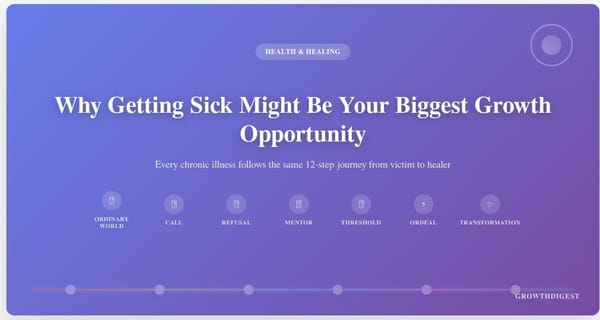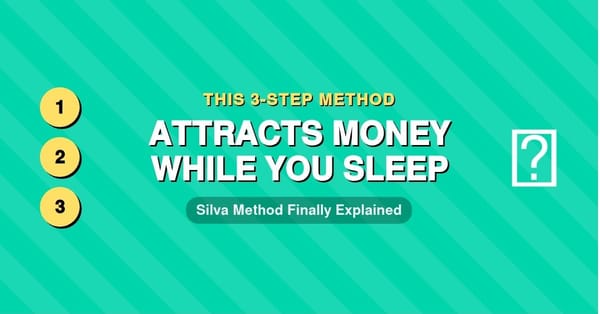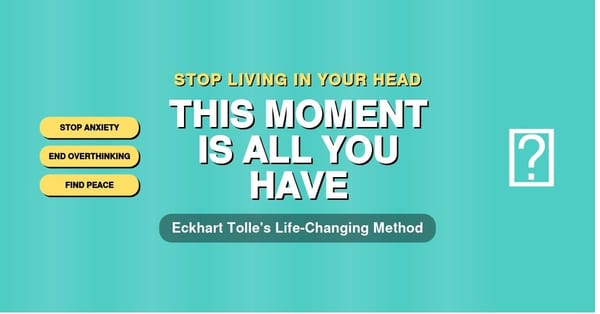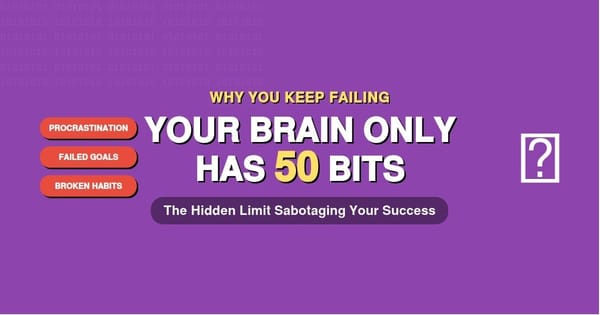The Science of Self-Healing: What Joe Dispenza's Placebo Research Really Means
The Science of Self-Healing: What Joe Dispenza's Placebo Research Really Means
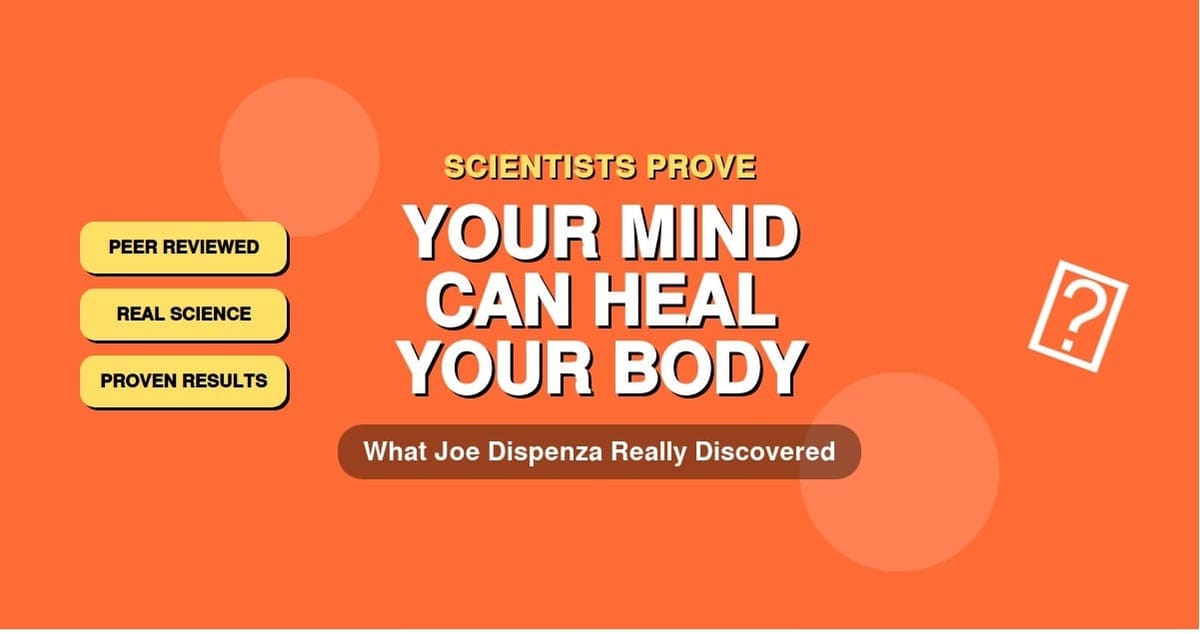
How your mind becomes medicine—and why that's not just spiritual talk
The Story That Changes Everything
In 1986, Joe Dispenza was hit by an SUV during a triathlon. Four vertebrae were compressed and fractured. Six surgeons told him the same thing: he needed surgery with steel rods, or he'd never walk normally again.
Dispenza made a choice that seemed impossible to everyone around him. He said no to surgery and decided to heal himself using only his mind.
Nine and a half weeks later, he was walking. Twelve weeks later, he was back to training. No surgery. No medication. Just focused intention and an unshakeable belief that his body could heal itself.
This wasn't a miracle. It was the placebo effect in action—and it changed how we understand the relationship between mind and body forever.
What the Placebo Effect Really Is
Most people think the placebo effect is about "fake" healing. That's wrong. The placebo effect is about real healing triggered by belief.
When you take a sugar pill believing it's medicine, your body produces the same healing chemicals it would if you'd taken real medication. Your brain releases endorphins for pain relief, activates your immune system, and even changes gene expression—all because you expected to get better.
As Dispenza explains in You Are the Placebo: "The placebo effect is the body's pharmacy following the mind's prescription."
Your thoughts become your biology. Your beliefs become your medicine.
The Neuroscience Behind Mind-Body Healing
Here's what happens in your brain when the placebo effect kicks in:
Step 1: Expectation Activates Neural Networks When you believe something will help you, your prefrontal cortex—the thinking brain—sends signals throughout your nervous system. These signals trigger the same pathways that actual medication would activate.
Step 2: Chemistry Changes Your brain starts producing real healing compounds. Endorphins for pain relief. Dopamine for mood improvement. Even anti-inflammatory proteins that reduce swelling and promote tissue repair.
Step 3: Genes Express Differently This is where it gets remarkable. Your belief doesn't just change your brain chemistry—it changes how your genes behave. Dispenza's research shows that when people enter elevated emotional states like gratitude or compassion, their gene expression shifts toward healing and regeneration.
You're not stuck with the genes you inherited. You're programming them with your thoughts.
The Three Types of Placebo
Dispenza identifies three levels of placebo effect in his work:
1. The Conditioning Placebo
This happens when your past experience creates an automatic expectation. You've taken this pill before and felt better, so your body starts healing before the medication even takes effect.
2. The Suggestion Placebo
This occurs when someone you trust—a doctor, therapist, or healer—tells you something will work. Your body responds to their confidence and authority.
3. The Self-Placebo
This is the most powerful type. It's when you become your own source of healing by consciously changing your thoughts, emotions, and expectations about your health.
This third type is what Dispenza used to heal his spine. It's what you can learn to activate in your own life.
Why Your Body Believes What Your Mind Rehearses
Your nervous system can't tell the difference between a real experience and one you vividly imagine. This isn't metaphysical theory—it's neuroscience.
When you repeatedly visualize healing, your brain creates the same neural networks it would if healing were actually happening. Your body starts producing the chemistry of wellness because, from its perspective, wellness is already occurring.
This is why Dispenza's meditation techniques work. He guides people to:
- Imagine their ideal self in precise detail
- Feel the emotions of being healthy and whole
- Rehearse new thoughts and behaviors mentally
- Combine clear intention with elevated emotion
The result? Their biology shifts to match their mental rehearsal.
The Dark Side of the Placebo: The Nocebo Effect
If positive beliefs can heal, negative beliefs can harm. The nocebo effect occurs when expecting something bad to happen actually makes it happen.
Dispenza shares stories of patients who died shortly after receiving terminal diagnoses—not from their disease, but from the crushing weight of hopelessness. Their belief in inevitable death became a self-fulfilling prophecy.
This isn't about blaming people for their illness. It's about understanding the profound power our expectations have over our biology. Your thoughts are constantly sending instructions to your cells. What instructions are you sending?
Practical Applications: Becoming Your Own Placebo
You don't need a life-threatening injury to benefit from placebo principles. Here's how to apply Dispenza's insights to everyday healing and growth:
Morning Mental Rehearsal
Before getting out of bed, spend 10 minutes visualizing your day going well. See yourself feeling energized, responding calmly to stress, moving through your tasks with ease. Feel the emotions of success before it happens.
Elevated Emotion Practice
Deliberately cultivate feelings of gratitude, joy, or compassion for 5-10 minutes daily. These elevated emotions signal your genes to express health and vitality. Your body literally becomes chemistry of whatever emotion you repeatedly practice.
Rewrite Your Health Story
Notice the stories you tell about your body. "I always get sick in winter." "I have bad genes." "My back always hurts." These stories become biological instructions. Start telling a new story about your body's capacity for healing and strength.
Present Moment Awareness
Stress hormones keep your body in survival mode, shutting down healing processes. Regular meditation or mindfulness practice activates your parasympathetic nervous system—the body's natural healing state.
The Limits and Cautions
Dispenza is careful to note that placebo isn't a cure-all. Broken bones need to be set. Infections may need antibiotics. Emergency medicine saves lives.
But for chronic conditions, autoimmune disorders, depression, anxiety, and many other health challenges, the mind-body connection offers real hope. The placebo effect works best when combined with appropriate medical care, not as a replacement for it.
The goal isn't to avoid all medication or medical intervention. It's to recognize that you're not a passive victim of your biology. You're an active participant in your own healing.
What This Means for Your Life
You are more powerful than you've been taught to believe. Your thoughts aren't separate from your body—they're constantly creating your body.
Every time you think "I'm getting old," "I'm tired," or "I can't handle stress," you're giving your cells instructions. Every time you imagine feeling strong, healthy, and capable, you're activating healing pathways.
This doesn't mean forcing positive thinking or denying real symptoms. It means approaching your health with curiosity instead of fear, possibility instead of resignation.
As Dispenza writes: "You are not doomed by your genes and hardwired to be a certain way for the rest of your life. A new you requires only that you change your mind."
Starting Your Practice
Begin small. Choose one area where you'd like to experience healing or improvement. Maybe it's better sleep, less anxiety, or more energy.
For the next week:
- Spend 5 minutes each morning visualizing yourself feeling exactly how you want to feel
- Notice and gently redirect negative thoughts about your health
- Practice one elevated emotion daily—gratitude, appreciation, or compassion
- Pay attention to how your body responds to different thoughts and feelings
Your mind has been prescribing your experience all along. Now you can learn to write better prescriptions.
The placebo effect isn't about tricking your body into healing. It's about remembering that your body was designed to heal—and your mind holds the key to activating that design.
You are the placebo. You always have been.
For deeper exploration of these concepts, read "You Are the Placebo" by Dr. Joe Dispenza and "Becoming Supernatural" for advanced meditation techniques.
